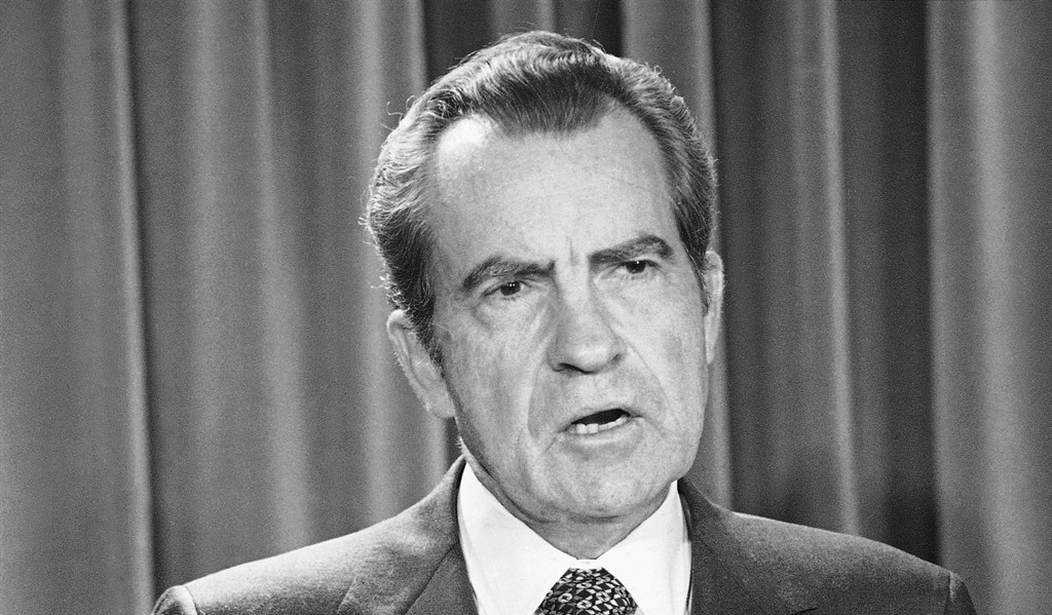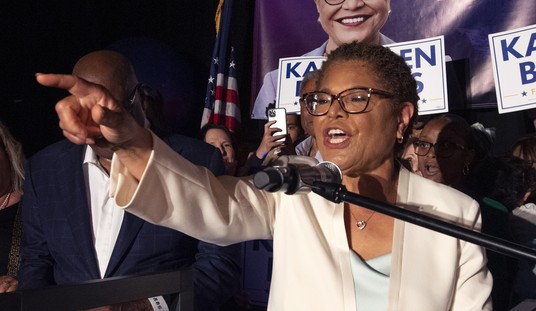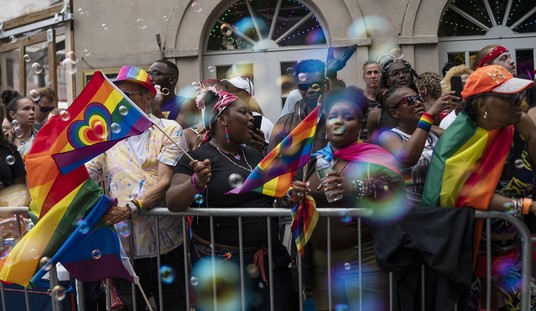Nixon and History
Yesterday, August 8th, was the 49th anniversary of the resignation of President Richard Nixon. I remember the event well, even though I was not quite thirteen. My father had insisted we watch the proceedings in the evening news every day, telling me that I was seeing history in the making. As usual, he was correct.
Richard Nixon had an extensive political career; he served as a Representative, Senator, Vice President, and President. He was re-elected to the White House in 1972 in a historic 49-state landslide before resigning in disgrace in 1974.
It’s interesting to take a closer look at Nixon and how his legacy could have been very, very different.
Nixon and a Political Career
Richard Milhous Nixon was born on January 9, 1913, to a Quaker family. He graduated third in his class at Fullerton Union High School, then Whittier College, graduating summa cum laude with a B.A. in history from Whittier in 1934. He attended Duke University School of Law, where he was elected President of the Duke Bar Association. He graduated third in his class in June 1937.
He married Pat Ryan in 1940; they had two daughters, Tricia (born 1946) and Julie (born 1948). Nixon served in the Navy in World War 2, rising to the rank of Lieutenant Commander; he ended up commanding a South Pacific Combat Air Transport Command and received a Navy Letter of Commendation. He left active service in 1946 but stayed in the Navy Reserves, retiring as a Commander in 1966.
Following the war, Nixon served from 1947 to 1950 as Representative from California’s 12th district, then as Senator from California from 1950-1953, when he became President Dwight Eisenhower’s Vice-President from 1953 to 1961.
Then, in 1960, he decided to run for President himself.
Nixon and 1960
Richard Nixon ran for President the first time in 1960.
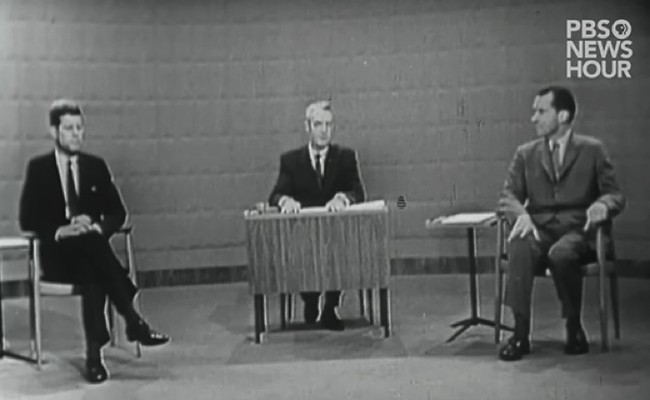
The 1960 election introduced something new into American Presidential campaigns: A televised debate. Moderated by Howard K. Smith of CBS News, the debate aired on September 26, 1960. While some listening to the debate on the radio thought Nixon comported himself well, television viewers had a different view, comparing Nixon’s nervous demeanor, sweaty face, and heavy five-o’clock shadow to the neatly turned-out, urbane, smooth-speaking Kennedy. Nixon lost the 1960 election to Kennedy by 303 to 219 electoral votes.
Nixon wasn’t about to quit, however. In spite of an earlier, famous comment from the former Vice President, only eight years later, the American people would indeed have Dick Nixon to kick around once again.
Nixon as President, and Watergate
In 1968, Richard Nixon quickly cinched the Republican nomination, running against Democrat Hubert Humphrey and Independent George Wallace. He won handily, 301 electoral votes against Humphrey’s 191 and Wallace’s 46. His Presidential policies were by no means conservative; he implemented wage and price controls, normalized relations with Communist China, and disengaged the United States from South Vietnam. He created the Environmental Protection Agency in spite of having no enumerated power in the Constitution allowing him to do so; he also created the Occupational Safety and Health Administration (OSHA) and started the War on Drugs.
He was a popular President, though. In the 1972 election, running against Democrat George McGovern, Nixon handed his Democrat opponent a real shellacking, gaining 520 electoral votes to McGovern’s 17 – the Democrat carrying only Massachusetts and the District of Columbia. It was a stunning landslide, and handed Nixon a big mandate for his second term.
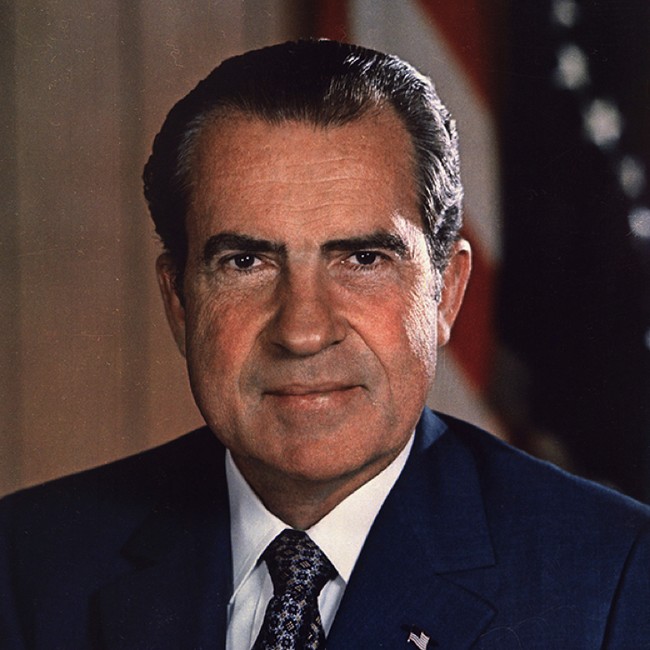
Nixon then proceeded to squander that mandate.
On June 17, 1972, police apprehended five burglars at the office of the Democratic National Committee in the Watergate Hotel. The resulting Watergate scandal was to prove the downfall of a President. Nixon and several of his personal aides, including Chief of Staff H.R. “Bob” Haldeman, were implicated in the attempt to cover up the event and to distance the Nixon Administration from the burglars.
On Aug. 7, 1974, U.S. Sen. Barry Goldwater, R-Ariz., U.S. House Minority Leader John Rhodes, R-Ariz., and U.S. Senate Minority Leader Hugh Scott, R-Pa., belled the cat. They met with Nixon and informed him that his support among the GOP had collapsed and that he faced all-but-certain impeachment, conviction, and removal from office. Nixon announced his resignation the next day.
I won’t re-litigate the Watergate affair here. There is an excellent blow-by-blow description at the link above. But imagine if, the morning after the arrest, President Nixon had called a press conference and announced the following:
Last night, five men were arrested burglarizing the Democratic National Committee headquarters in the Watergate Hotel. I had no personal knowledge that this burglary had been planned or that it was being carried out, but now I do know, and I have this to say: I will direct the Justice Department to prosecute the burglars to the fullest extent of the law. I will not tolerate this sort of illegal activity by anyone, of any political party, on any political party or anyone else. This Administration will not tolerate lawlessness.
Imagine the difference in Nixon’s legacy.
Nixon and Legacy
Yes, if he had made the statement above, he would have effectively been throwing a bunch of GOP operatives under the bus. But it wasn’t the crime that brought Nixon down; it was that cover-up. Without the cover-up, Nixon almost certainly would have served out his second term, and national politics over the next decade would have been very different.
But Richard Nixon was a nervous, paranoid man at this point in his career. He did tacitly approve the attempt at the cover-up, and he paid the price.
Never has an American President so haplessly enabled his own downfall. Not even his appearance on one of television’s most popular shows of the time could save him.
And, in one of history’s more ironic turns, yesterday was also the one-year anniversary of the Mar-A-Lago raid. Again, the White House is occupied by a “crook,” and this time a much more egregious one; again, the country is in turmoil. It seems we never learn from our own history – probably because the schools no longer teach it.
Editor’s Note: A previous version of this article inadvertently stated this was the 39th anniversary of Nixon’s resignation rather than the 49th. We apologize to our readers for this error.

